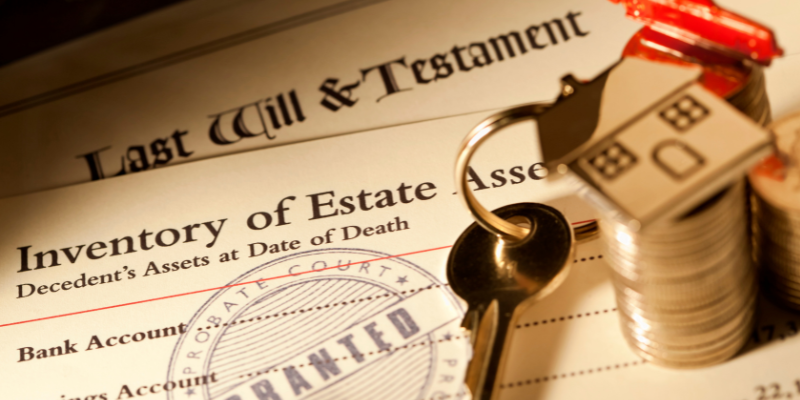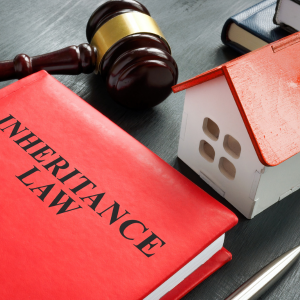
Can an Executor of a Will Sell a Property?

In Maryland, the executor of a will, also known as the personal representative, is authorized to sell property as part of their estate administration duties. Several steps are necessary to comply with Maryland probate law and the will’s terms.
First and foremost, the executor must obtain official authorization from the probate court by being formally appointed as the personal representative. Once appointed, the executor must determine whether selling the property is necessary to pay off debts or distribute assets to beneficiaries.
They may need to obtain court approval for the sale, especially if specific provisions in the will or state probate regulations require it. When selling real estate, the executor must also ensure that they are acting in the best interests of all parties involved, as well as maximizing value.
By following these guidelines and communicating clearly with beneficiaries, an executor can effectively manage and carry out their responsibilities when selling property within Maryland’s legal framework.
Understanding Property Laws for Executors in Maryland
In Maryland, executors are very important because they are in charge of managing and distributing the estate of a deceased person. This often includes dealing with real estate. When executors are deciding whether to sell property as part of the probate process, they need to know the laws about property.
In Maryland, an executor, also called a personal representative, may sell real estate if it serves the best interests of the estate and its beneficiaries. However, the executor must first ensure full compliance with the deceased’s will and state probate laws before proceeding. If you’re exploring faster solutions, here’s how 4 Brothers Buy Houses can help simplify the process while staying within legal requirements.
The executor can usually go ahead with the sale without court approval if the will clearly gives permission or if everyone involved agrees. On the other hand, if permission isn’t clearly given or if there are disagreements between heirs or beneficiaries, the Orphans’ Court may need to approve the sale in order for it to be legal.
Executors should also be aware of any debts or liens on the property that could make it harder to transfer, and they must pay these off before the property can be transferred. If family members want to keep ownership instead of selling, executors might look into options like distribution in kind.
Executors can do their jobs well and responsibly by understanding these subtleties, which helps
Key Responsibilities of an Executor in Estate Management
In Maryland, an executor is very important for managing an estate. They have a lot of duties to make sure that the estate of a dead person runs smoothly. One of their main jobs is to collect and protect the deceased person’s belongings, which include real estate.
The executor has to make a list of all the assets, including any property, and figure out how much they are worth. The executor must decide if selling the property is necessary or helpful for paying off debts or giving assets to beneficiaries.
If heirs object or the will doesn’t clearly give this power, the sale of property may need to be approved by a court. Also, executors must use the estate’s money to pay off any debts and taxes before giving out the rest of the money according to the will or state law.
This usually means dealing with a lot of paperwork and keeping clear records of all the estate’s transactions. Executors also need to talk to beneficiaries clearly and keep them up to date on important decisions and deadlines during the probate process.
Taking care of these duties carefully makes sure that the estate is run well and in line with Maryland law.
Navigating Probate Process: A Guide for Executors
As an executor in Maryland, there are several important steps you must take to complete the probate process, particularly when it comes to selling property. Before they can manage and distribute the deceased’s estate, executors must first ensure that the probate court has officially appointed them as executors.
This includes obtaining letters of administration or testamentary, which are required for accessing and managing assets. After receiving permission, executors must compile a list of all the estate’s assets, such as real estate, to determine their value and whether there are any debts or liens.
If there is a will, the terms of the will and applicable state laws must be followed when selling property during probate. Executors should be aware that court approval is usually required before proceeding with a sale, unless the will specifies otherwise.
To achieve fair market value, it’s essential to work closely with real estate agents familiar with probate sales procedures. Additionally, all sale proceeds must be properly documented and distributed according to legal requirements and beneficiary rights. For a quicker, more streamlined option, cash home buyers in Maryland and surrounding states can help simplify the process.
Being open with the beneficiaries and strictly adhering to Maryland’s probate rules will help avoid arguments and make the transaction run more smoothly.
Executor’s Guide to Managing Estate Assets Effectively
In Maryland, an executor is responsible for effectively managing estate assets during the probate process, particularly when it comes to property sales. As the appointed representative of the deceased’s estate, the executor must follow state laws and probate court requirements while ensuring that all actions are consistent with the decedent’s will.
Selling real estate is frequently required to pay off debts or distribute assets among beneficiaries, so executors must understand local regulations. Key responsibilities include obtaining a professional appraisal of the property’s value, putting it on the market, and negotiating sales contracts.
Executors must also seek probate court approval for transactions involving significant estate assets, such as real estate. Clear communication with heirs and beneficiaries is crucial for avoiding disputes and maintaining transparency.
Executors can fulfill their fiduciary duties within Maryland’s probate framework by meticulously following legal procedures and keeping detailed records of all transactions.
Legal Restrictions on Executors Selling Property in Maryland

State probate laws in Maryland spell out what an executor can and can’t do when it comes to selling property. These laws say that executors must follow their fiduciary duties to the letter. Before selling any real estate, executors must first get permission from the probate court through Letters of Administration.
This authority depends on the executor doing what is best for the estate’s beneficiaries and creditors. Before giving out the money from the sale of a property, the executor must also make sure that all debts and taxes owed on the estate are paid.
Executors must also follow any specific instructions in the deceased person’s will about how to handle property transactions. If there is more than one beneficiary or conflicting interests in the property, it may be necessary to get permission or agreement from all parties involved to avoid possible legal problems.
Maryland law says that executors must be fair and open during this process. They must give everyone involved proper notice and make sure that any assets that are sold get their fair market value. If the executor doesn’t follow these legal requirements, they could be held personally responsible, or the sale itself could be challenged.
Common Challenges Faced by Executors in Real Estate Transactions
When handling real estate transactions during the probate process, executors in Maryland often run into a lot of problems. One of the biggest problems is figuring out how to follow the complicated legal rules that come with selling property, which means following both state probate laws and local real estate rules.
The probate court usually has to give executors permission to sell the property. This is something they need to make sure they can do. This can take a long time, especially if the beneficiaries don’t agree on what to do with the assets or if the will isn’t clear about how to sell them.
Executors must handle practical tasks such as ensuring the property is accurately valued, addressing any debts or liens, and completing necessary repairs or maintenance to make it marketable. Coordinating with real estate lawyers and potential buyers can be time-consuming and demanding. Working with investor home buyers in Baltimore and other cities in Maryland can help simplify and speed up this process.
Executors also have to balance these duties with their duty as a fiduciary to act in the best interests of all beneficiaries and make sure that all of the money from the sale is given out according to the wishes of the deceased as stated in their will.
Step-by-Step Guide to Probate Court Approval for Property Sale

In Maryland, the process for an executor to sell property as part of an estate includes several critical steps that must be approved by the probate court. First, the probate court must officially appoint the executor as the estate’s personal representative, giving them legal authority to manage and sell estate assets.
Once appointed, it is critical to obtain a comprehensive appraisal of the property to determine its fair market value, which will be used to justify any sales offers. The executor must then file a petition with the probate court requesting permission to sell the property, explaining why the sale is necessary or beneficial for debt repayment or asset distribution to heirs.
The petition typically includes information about potential buyers and proposed terms of sale. Following the filing, it may be necessary to notify all interested parties, including beneficiaries and creditors, and give them the opportunity to object or support the proposed transactions.
If no objections arise or if any are resolved in favor of the sale, the court will usually hold a hearing to review the details before granting approval. Once approved, the executor can complete the sale under court supervision, ensuring all proceeds are handled in compliance with Maryland’s probate laws. Throughout the process, 4 Brothers Buy Houses can help make the transaction smoother and more efficient.
What Are the Duties of an Executor of a Will in Maryland?
In Maryland, the duties of a will executor are critical and multifaceted, particularly when dealing with real estate and probate matters. First and foremost, the executor must manage the deceased’s estate in accordance with Maryland probate laws.
This includes identifying, collecting, and protecting the deceased’s assets. The executor must also pay any debts and taxes owed by the estate before distributing the remaining assets to the beneficiaries specified in the will.
When real estate is involved, the executor may be required to sell property in order to settle debts or distribute assets properly. In Maryland, selling property necessitates following specific legal procedures, such as obtaining court approval if necessary and ensuring that all transactions are transparent and fair in order to protect both the estate’s value and the interests of the beneficiaries.
Executors must also keep detailed records of all estate-related financial transactions and report these records to interested parties or probate courts as needed. Overall, executors play a critical role in ensuring that an estate is settled efficiently and legally in accordance with both state laws and the wishes expressed in the will.
How Powerful Is the Executor of a Will?
In Maryland, the executor of a will has significant authority and responsibility for administering and settling the estate. As the personal representative, the executor is in charge of gathering and inventorying the decedent’s assets, paying debts and taxes, and distributing any remaining assets to beneficiaries as specified in the will.
One of an executor’s most important powers is the ability to sell the deceased’s property to pay off debts or distribute it to heirs. However, this authority is subject to certain legal obligations and limitations outlined in Maryland probate law.
The executor must ensure that any property sale is done in a transparent manner that follows both the will’s provisions and court regulations. In some cases, probate court approval may be required prior to proceeding with a sale.
Executors are also accountable for acting in the best interests of all beneficiaries and upholding fiduciary duties throughout the administration process. Understanding these responsibilities is critical for executors who manage real estate in Maryland estates.
Helpful Maryland Blog Articles
- Selling Partial Ownership Of A House In Maryland
- Equity Requirements For Selling Your House In Maryland
- Top Property Managers In Maryland
- Tenant Damage vs. Normal Wear And Tear In Maryland Rental Properties
- Who Pays For Appraisal And Inspection In Maryland
- How To Successfully Sell Your House At Auction In Maryland
- Can An Executor Sell Property In Maryland
- Homeowners Insurance When Selling Your Maryland Home
- Selling Your Maryland Home As-Is Without Renovations
- Selling Costs For Homeowners In Maryland
- Can A Seller Legally Back Out Of A Real Estate Contract In Maryland?
- Selling Your Maryland Home With An Incarcerated Spouse

| WILLS | LAST WILL AND TESTAMENT | LAST WILLS AND TESTAMENTS | TESTAMENTARY TRUSTS | REGISTERS OF WILLS | REGISTER OF WILLS |
| DECEDENTS | ATTORNEYS AT LAW | LEGAL ADVICE | REALTOR | TRUSTS | REVOCABLE TRUST |
| INHERITANCE TAXES | INHERITANCE TAX | CASH | DEEDS | JOINT TENANCY WITH RIGHT OF SURVIVORSHIP | SURVIVORSHIP |
| TENANCY IN COMMON | TENANTS IN COMMON | SELLER | MORTGAGE | ESTATE PLANNING | DEATH CERTIFICATES |
| TERMS OF SERVICE | PROPERTY TAXES | INTESTATE | FREQUENTLY ASKED QUESTIONS | FAQS | INHERITANCE TAX |
| PROBATE IS THE | PROBATE IN MARYLAND | PROBATE IS THE LEGAL |
